5 Lessons I Learned from Writing a Master’s Thesis
Yes, I know I’ve been writing a lot about my recent graduate school achievement lately and it might be getting tiresome to my regular readers. Don’t worry; I promise it’ll only go on for like, two more months (just kidding!). In all seriousness, though, my Master’s thesis did teach me a lot about writing, as much in science as in general, and since it’s been such an insightful experience, I thought it would be fun to share what I learned on my creative writing blog.
So on that note, here are five lessons I learned from writing my Master’s thesis. Enjoy!
1) A thesis will never, ever be perfect. Ever.
This point is worth mentioning first as it applies to all types of writing. Seasoned writers all know that a huge part of writing is rewriting, and that arguably holds true for nonfiction more than any other genre. One of the most important lessons I learned through my years in college and grad school is that scientists can’t hope to turn out quality papers and articles without rigorous research and engaging discussions of their results, but the challenge of writing about science is that science is constantly changing. New research is being published every day and new ideas are emerging every hour, making it nearly impossible to keep drafts of a paper or thesis updated to the minute.
But an endless stream of new research isn’t the only challenge of academic writing. Perfectionism has long been a barrier to productivity, as any writer with a strong inner critic can attest. You can strive to cite every relevant reference, cover every possible discussion point, and smooth out every error to the tiniest misplaced comma, but at some point you just have to accept that your paper/article/thesis will never be flawless by the time you submit it for publication. Don’t sweat it; that’s what editors are paid for!
Writing my thesis definitely pushed my limits in academic literacy and technical perfectionism. Tackling both these obstacles every day, it’s a wonder I ever even finished the first draft!
2) Scientific writing is not the same as literary writing.
Most of my writing takes the form of stories and poetry, which presented a challenge for me when it came to writing the main chapter of my thesis. Despite constant reminders to myself of the differences between scientific and literary composition, more than once I found myself falling into old creative writing habits, including, but not limited to:
- omitting important explanations in the introduction,
- using layman’s terms in place of scientific terms,
- lampshading flaws and shortcomings in the study (yes, really), and
- building suspense to the “grand reveal” of my results (which I still think was justified given that I discovered we were dealing with a different species than we initially thought).
Honestly, my artistic side wants to turn everything I learned throughout my Master’s program into a novel, but my scientific side insists on being reasonable (i.e. following my professor and colleagues’ directions) and sticking to hard facts and logical discussions without embellishing the text with my storytelling voice. If this whole endeavor wasn’t challenging enough to begin with, these dueling voices in my head made the final stretch one heck of a ride!
3) Between the time you start your thesis and the time you defend it, your project will change at least a dozen times.
And if you’re lucky, that’s the most it will change. I was accepted into my Master’s program with a proposal for a phylogeographic study of four reef fish species spanning the Atlantic Ocean. By the time I defended my thesis, the project had been narrowed down to one species in Brazil, which later turned into a study of the entire genus across the Atlantic and part of the Pacific, and had been expanded from a purely genetic analysis to include an ecological component about the fish’s feeding activity. Now try reading back this paragraph a few times fast and you may get a sense of the headaches I went through over the last few years.
Still, exploring different projects is part of the grad school experience (or so I hear), and it was certainly an educational endeavor. Though more than a little frustrating at times, it did offer an insight into the life of a scientist: methods will fail, new ideas will emerge, projects will change, and in the end, you’ll find yourself arduously studying a subject you’d never even considered when you started. New grad students, be warned: until you finally defend your thesis/dissertation, you’re in for an academic rollercoaster ride!
4) Coauthoring is both easier and harder than writing alone.
Speaking as a writer who prefers to work solo, I’ve found there are advantages and disadvantages to collaborating with other authors on an article. On the one hand, different perspectives mean different ideas and contributions, which more often than not result in a well-rounded study and, consequently, a high-quality paper. On the other hand, opinions between authors can (and will) conflict during the writing process, which will make turning out the final draft all the more challenging.
As the lead author of a paper with five names to its title (and counting), I’m in charge of writing the text and integrating the other authors’ notes and revisions into each draft. The main advantage of this is that each researcher has their own area of expertise, so I’ve gotten plenty of help as much for the genetic part of the study as for the ecological part. However, some points in the discussion tend to have opposite approaches, and sure enough, I’ve rewritten some paragraphs a few times over after disagreements arose between my coauthors about how best to discuss the results.
Finding a balance hasn’t always been easy, but since all my solo writing experience has been related to fiction, I’m glad to have so much extra input on this project. All that matters is that the final paper is worthy of publication!
5) Successfully completing and defending a thesis brings an incredible sense of accomplishment.
At the risk of sounding cheesy, words cannot describe the elation I felt while standing before the audience at my defense and thanking them for watching the presentation I had just concluded. In that moment, all my hard work, perseverance, and bouts of stress, anxiety, and tears had finally been validated. I was so proud of myself for having made it to that point that I smiled through the whole evaluation and Q&A segment that followed. It was one of the greatest successes of my life, and though it isn’t a bestselling novel, the thesis I toiled over for a year and a half will always hold a special place among my most treasured pieces of writing.
The only question now is whether this sense of achievement is enough motivation to take on double the hard work in pursuit of a doctorate…
What about you? Do you have any college or grad school experiences to share? How have they influenced your writing?
All images in this post are from the comic series “Piled Higher and Deeper” (a.k.a. PHD Comics) by Jorge Cham; I own nothing! For a hilarious insight into life (or lack thereof) in academia, I highly recommend you check out his work!

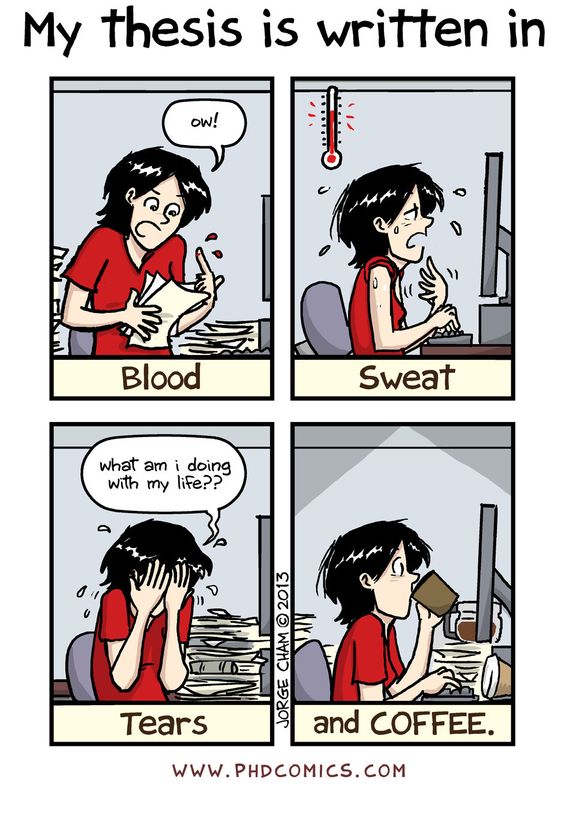
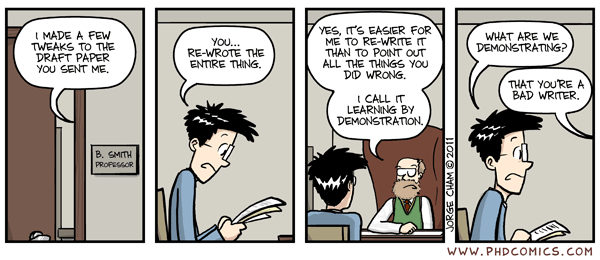
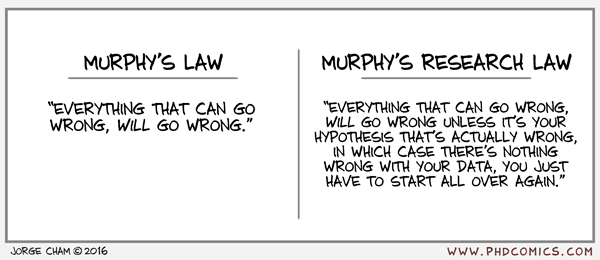
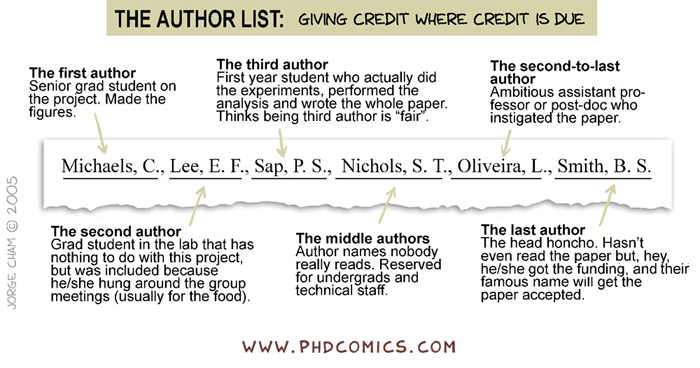
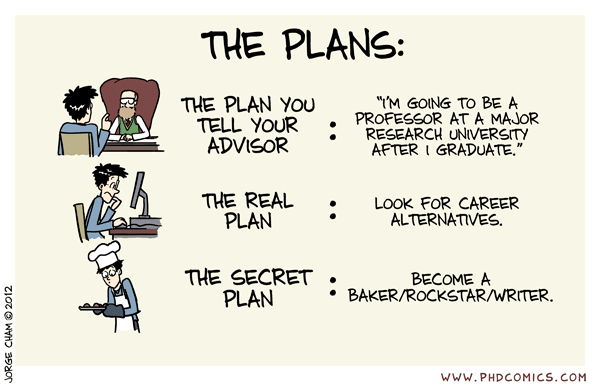

Recent Comments